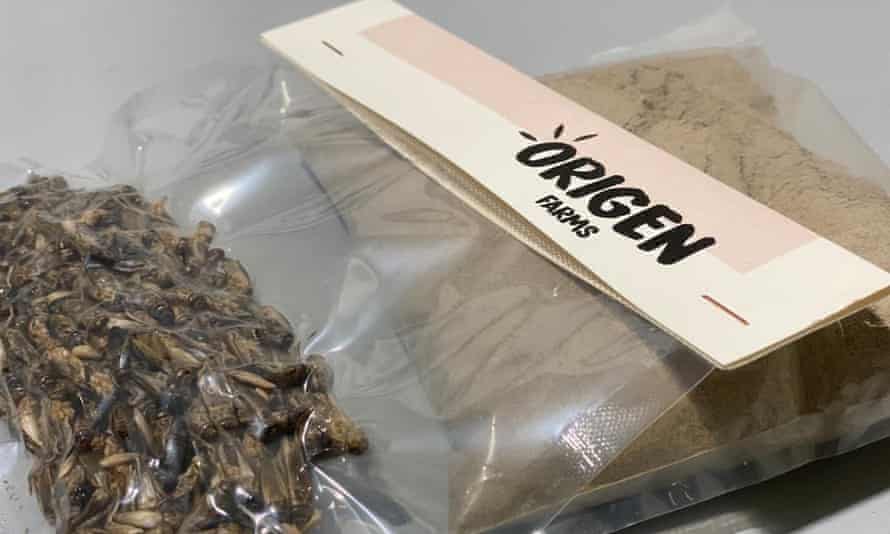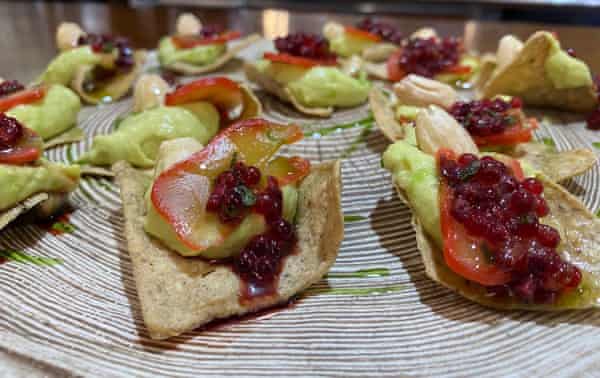There are no gargantuan mastiffs or shepherds on quad bikes watching over the hundreds of thousands of newborn animals that tumble and crawl around an unlikely farm among the wind turbines, motorways and patchwork fields of this corner of Castilla-La Mancha, in central Spain.
Nor are there any fences to pen them in. Plastic tubs, shelves and the insulated walls of a unit on a windswept industrial estate do the job perfectly well. But whatever Origen Farms lacks in land, tradition and rural romance, it aims to make up for in innovation, enthusiasm and resilience.
Founded almost two years ago, the business rears a single beast: Acheta domesticus, the house cricket.
The farm is one of a growing number of companies in Europe and elsewhere seizing on the protein possibilities of insects. But while others focus on growing insects for pet food or animal feed, the Spanish startup has its antennae trained on the human market.
Over the course of each 35-day cycle, the farm produces three tonnes of crickets – 80% of which are ground into protein-rich flour for culinary use, including pasta, snackbars and crackers.
Some of the 250,000 young insects being grown in the 30C (86F) breeding room will be mixed with imported Mexican corn and reincarnated as tortillas or totopos (tortilla chips), seasoned with sesame or chipotle. Others will be dried and packaged as snacks, while the remainder will be frozen and shipped as animal feed.
The venture, based on the outskirts of the town of La Roda, near the city of Albacete, is the brainchild of three local childhood friends now in their early 30s: Andrés García de Lis, Francisco José Tébar and José Antonio Torres.

“We were looking to start a business that was sustainable and profitable,” says García de Lis. “We looked at various things, from spirulina to other kinds of insects, but we ended up going for crickets for human consumption because it’s a young market which could be profitable.”
Their model is built around the humble cricket and its habitually overlooked nutritional benefits. As well as being up to 70% protein, the animals contain iron, zinc, calcium and amino acids.
And yet, perhaps unsurprisingly, some in the town – whose economy depends mainly on traditional forms of agriculture, as well as paint manufacturing and other industries – questioned the wisdom of the enterprise.
“A lot of people have seen the potential in this; others have said we’re mad,” says García de Lis. “Our families love us very much, but they must also have wondered if we’re mad. But we got the money together.”
Their initial investment of €15,000 (£13,000) each, supplemented by bank loans and grants, funded the climate-controlled industrial unit, with its breeding room, nursery and large, ever-so-slightly Cronenbergian growing space, where 300 tubs house the crickets as they grow to their full size of a little more than 2cm, fed on a diet of cereal, vegetables and the gentle and carefully calibrated drips of the irrigation system.
The final stop on the insects’ journey is the refrigeration room, where the freezing temperature ensures what García de Lis calls una muerte dulce: a sweet death.
Production is hampered by Spanish law that does not allow insects to be processed into flour for human consumption. Instead, the frozen crickets are shipped to the Netherlands to be turned into flour. Once the flour arrives back, it can then be used to make tortillas and totopos for people to eat, which is permitted under the law.
“There are companies here in Spain that are very ready to partner with us and develop the technology to process the insects, but we’ll have to wait until we get the green light before we can really do something scalable,” says García de Lis.

They have sold around seven tonnes of frozen crickets so far – despite having to completely restock after Storm Filomena hit in January, bringing freezing temperatures and snowfalls not seen for 50 years. García de Lis, Tébar and Torres arrived at the factory to find the locks frozen and the pipes burst.
“We had to clean and disinfect everything because excess moisture breeds bacteria and fungus,” says García de Lis. “We saved everything we could, but it was another massive outlay and we had to start over again and look for new cricket colonies that we liked in Murcia.”
The trio plan to sell flour and totopos from July. A 200g pack of totopos, containing 40g of protein, is expected to cost €3.50 to €4 (£3 to £3.50). They hope to expand production to Latin America, starting with an organic range and diversifying into mealworms, spirulina and meat substitutes.
“The future is going to depend on how things go, but our aim is to find partners who will help us expand our ideas in other countries, and develop other lines with resources derived from crickets and other insects, such as frass [insect faeces] for agricultural fertiliser, chitin and meat substitutes,” says García de Lis.

They are also working on two franchise sites, where they will build a unit and provide equipment and training for anyone with €300,000 (£260,000) and a desire to break into the cricket market.
Tébar uses the cricket flour in a pudding served at his family’s nearby restaurant, while Torres reports making a rather fine risotto with it – and the company is keen to collaborate with chefs to develop the product’s potential. For the time being, however, the plan is to focus on the Mexican-inspired range.
“In Mexico, they eat chapulines (grasshoppers) in tacos and with other things,” says García de Lis. “And besides, everything Mexican is really fashionable right now, from taquerías to mezcal, so it’s a marriage of the two.”
Sign up here for the Animals farmed monthly update to get a roundup of the best farming and food stories across the world and keep up with our investigations. And you can send us your stories and thoughts at animalsfarmed@theguardian.com
The Link LonkMay 25, 2021 at 12:00PM
https://ift.tt/2QSl7ZI
Startup’s bug idea – to put cricket tortillas and chips on the menu - The Guardian
https://ift.tt/2RGyUAH
Chips

No comments:
Post a Comment